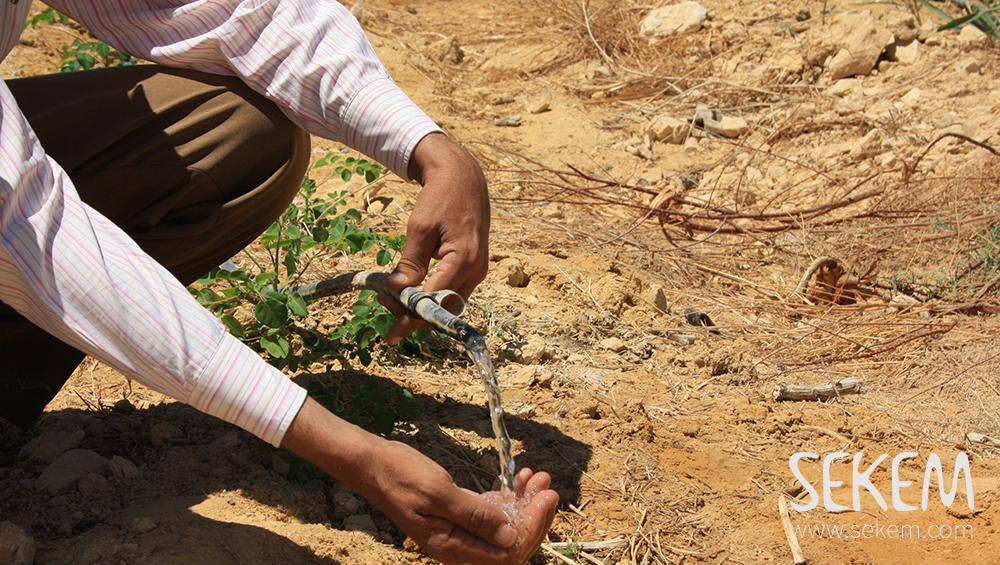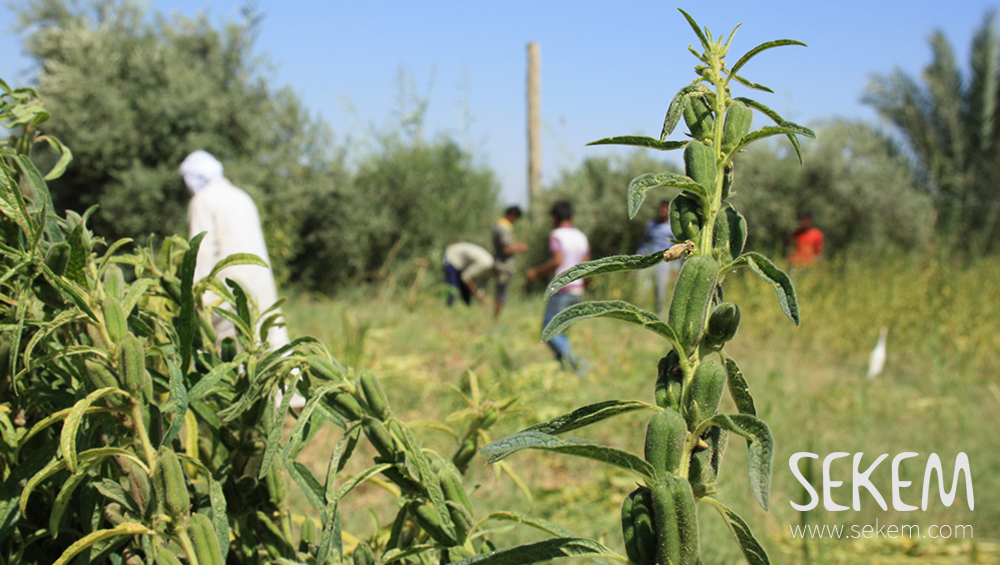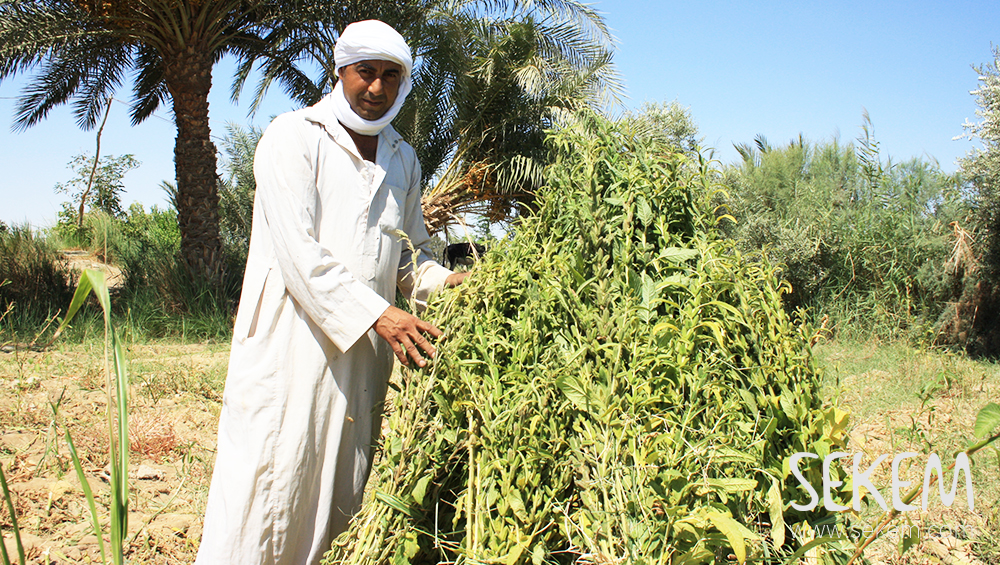“Open Sesame!” The magical phrase is already known since the 18th century from the fairy tale “One thousand and one Arabian nights”. Here, the saying is used as magic formula to open a sealed cave with a hidden treasure inside. Although, it has a metaphorically meaning in this context, sesame seeds feature such a wide range of amazing characteristics that they can easily be named as “treasure” or “magic seeds”. SEKEM cultivates sesame either for exporting the raw material to Europe or for producing sweet and in the same time healthy bars for the Egyptian market.
Sesamum indicum, the botanical name of the popular oil plant, has perfect features for the climatic conditions of Egypt: the plant thrives well in dry areas and needs relatively small amounts of water. Hence, sesame products are particularly important in Egypt’s cuisine. Tahina, a paste made from pure sesame is used for instance as sauce in several dishes and builds the basic ingredient in typical Egyptian creations such as hummus. And, sesame is also very liked as sweet variation. Unsurprisingly, when knowing that sesame already occurred in the Greek epoch of Egypt (4th to 1st century BC). It is even told that sesame was used in ancient Egypt. There are statements that the seeds were found in the tomb of Tutankhamun (Egyptian king from 1333 to 1323 BC). However, what is certain is that sesame was already planted in Mesopotamia around 3000 BC and has spread since then.
The undemanding sesame plant
SEKEM has been cultivating the versatile seeds since 1990 according to biodynamic guidelines. The harvest yields around 1 000 tons annually, with large parts coming from SEKEMs contracted farmers located all over Egypt. One of them is Mahmoud Farouk. On his 42 hectare farm near the oasis Fayoum, he uses 40 percent of the land for sesame cultivation. “We have a very dry and hot climate here, but it doesn’t affect the sesame”, tells the longstanding SEKEM farmer.
Sesame is a very undemanding species which handles simple soil and is hardly susceptible to diseases. Thanks to biological composts, no other fertilization is needed. A great advantage that the biodynamic cultivation brings with it, since soil, environment and the health of the farmers and their families are spared. “We pay high attention to a diversified crop rotation, which again contributes to keeping the soil fertile and healthy”, explains Mahmoud. Since sesame is a one-year summer plant, medicinal herbs can be cultivated in winter. Thus, the biodynamic guidelines are observed, in which plants that require a lot of nitrogen, are followed by varieties that enrich nitrogen. This improves the soil quality steadily and at the same time increases the harvest.

Similar to his ancestors in ancient Egypt, the Demeter-farmer Mahmoud Farouk still uses the system of flood irrigation. This watering method is controversial and therefore no longer used on other SEKEM farms, but is still very common in the oasis Fayoum, where agriculture was already practiced over 4000 years ago. SEKEM conducts various researches on adequate alternatives. “Sesame only needs one water supply per week”, explains Mahmoud. “The plant has an extensively branched root system whereby small amounts of water are sufficient to nourish it.”
Beneficial for people and the environment
At the beginning of May sowing begins at Mahmoud’s Farm. Approximately 60 employees are involved. After about two months the plant can grow up to a meter high and begins to bloom. Then the sesame develops comparatively fast. From the blossoms, oval shaped fruit bodies arise, which become brownish with the time. If they start to open after four to five months, the harvest time has come. Mahmoud’s harvesters cut the panicles by hand and place them on large cloths until they are dried. “The upright position is important so that the seeds do not fall from the pods”, explains the farmer Mahmoud. Only after 20 days the perennials are inverted and shaken so that the seeds fall out.

Packed in a bag the sesame is then transported to SEKEMs company Lotus. Here the seeds are cleaned with professional machines. Instead of applying health-threatening substances for the final removal of insects, carbon dioxide overpressure is used. And then Lotus supplies either SEKEMs company ISIS Organic or exports the sesame to Germany, Holland and Switzerland.
Sesame is not only popular in Egypt, but also in Europe people believe in the vitality of the grains or like the nutty taste in different dishes. Sesame can be used for instance for bone health because of its calcium richness, it lowers the blood pressure and the high-quality oil, which is made from the grains, makes the skin rich and also tastes excellent in salad.
Survival artist
“Although Egyptian agriculture is facing many problems, such as climate change or water scarcity, I am not concerned about the sesame”, Mahmoud Farouk reports. “The plant is so resistant and easy to maintain, but at the same time brings so many advantages for the soil as well as for nutrition that it is already known as a survival artist among the crops.”
Through this resilience, sesame has something in common with the SEKEM Initiative, which has been developing in the middle of the desert for almost 40 years. And so the phrase “open sesame” does not seem that magical anymore. The sesame cultivation opens the door to a healthy and sustainable agricultural cycle and at the same time supports the cultivation of several other plants. And: Is this sustainable cycle not nearly like a hidden treasure behind all the burdens and challenges that ecology is facing today?
Christine Arlt/Noha Hussein
Demeter-certified dates at SEKEM farm
New sweet temptations from the successful duo Davert and SEKEM
Get to know Ibrahim Saad, agricultural planning manager of SEKEM

